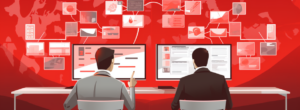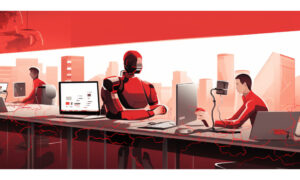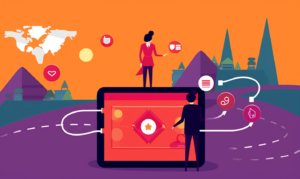What are the benefits of digital HR?
- 8 Min Read
HRD Connect examine the benefits of digital HR for people leaders and the wider business.
- Author: HRD Connect
- Date published: Jan 17, 2020
- Categories

Everyone can see the current phase of technological shifts as the fourth industrial revolution.
Technologies like artificial intelligence, automation, robotics process automation, and digitalisation have taken a fresh outlook on business, reduced expenses and made processes more data-driven and efficient.
Digital transformation is not just a daunting technological task, it’s a people challenge too. As the digital economy evolves and as the skills and expectations of the workforce begin to shift, organisations need to be ready to respond to this challenge.
The HR function has always been a vital cog in an organisation’s machinery and keeping it well-oiled is one of the function’s primary objectives. The growing importance of the HR function as a strategic arm of business has made digital transformation even more important for HR leaders.
The function needs to be involved in identifying what roles can be automated or robotized and what roles should be carried out by humans. In identifying what skills are required, HR teams can develop staff internally and recruit accurately externally. At the same time, HR departments will need to help their people adjust and stay relevant in the new world of work.
HR leaders should prepare to embrace digital HR through data literacy, and be adept at using complex problem solving and project execution methodologies, such as design-thinking, as these technologies will be the catalyst for the new face of HR.
According to Deloitte’s study on HR tech disruptions, the use of AI, cognitive bots, and intelligent predictive software within HR have all gone up and today many organizations are quickly bringing new functionalities into HRs approach to managing the workforce.
Digital HR has grown considerably over the last decade, with many organizations now using some form of digitalisation within the purview of the HR function.
Digital HR is a form of process optimization in which social, mobile, analytics and cloud (SMAC) technologies are leveraged to make the HR function more efficient, effective, and connected. In other words, it’s a tectonic shift in the way Human Resources functions.
The sole application of new technologies is not what makes HR digital, however. As Jeff Mike, from Bersin puts it: “Digital HR should also align culture, talent, structure, and processes to balance efficiency and innovation, as well as to sustain a measurable impact on the greater organization as it continuously transforms.”
Benefits of digital HR Tech can be faster, more accurate and more efficient processes, and reduced HR costs. Here is a list of the benefits of digital HR:
Benefits of digital HR
Time/Leave management
Manual management of time/leave can be disastrous for any organisation. Digital HR can track the pertinent information and manage leave requests, monitor remaining leaves and automate the time-consuming process of time/leave management.
Managing Information
Digital HR simplifies the process of accessing all employees’ essential information, in addition to simplifying decision-making, as all data is instantly accessible and up to date. Just as employees like to be able to choose how and when they manage their professional emails and workload, they want to manage their HR data.
At the other end, access to confidential information can be controlled for employees making sure the right information is available to the right people at the right time. Maintaining all the organisational data, information and content at one centralized secure location can ensure it’s accessible at any time. Digital HR can also provide document management capabilities – the organisation can learn what employee is reading, and can improve productivity by minimizing strenuous paperwork, access old documents or archive training manuals or handbooks.
Using data & analytics
As organisations are starting to understand the value data analytics can add to the business, areas like pre-selection, learning & development, and employee engagement can be measured by digital HR. The HR function can benefit a great deal by learning to make sense of this data. Predictive analytics tools, placed at the disposal of the HR function, can also help in improving HR processes and ensuring employee satisfaction.
Future-proof recruitment
Smooth mobile experiences, data-driven pre-selection processes and personalized, AI-based onboarding programs. These are just a few of the many examples of the benefits from digital HR in recruitment. According to a study by Undercover Recruiter in 2018, AI is expected to replace 16% of HR jobs within the next 10 years.
Improve the employee experience
For millennials, the line between their professional and personal lives has become blurred. Yes, they’ll check their social media account during office hours, but they’ll equally check their work emails during the weekend. As such, they expect to be treated as customers, and they want their employer to provide them with a similar user experience when it comes to the digital work environment. Enterprise social platforms like Slack, Yammer, and Workplace by Facebook allow employees to work closely together on group activities and tasks and keep all users updated on the latest developments.
Shifting focus on the core activities
Digital HR can automate any time-consuming manual processes, allowing you to focus on more productive and important work. Any organisation with a large number of employees will find it difficult to manage their information on paper. Digital HR allows HR professionals to streamline workflows to improve overall work management and productivity.
Employee Development
Digital HR can help in training and learning and development activities. It can facilitate employee development from training courses to performance appraisal. Regular appraisals boost employee morale and give them incentives to maintain high standards of work – the software stores data on the issues discussed, feedback given, and the goals/objectives you decided together.
Digital HR Solutions
AI based digital HR solutions in Recruitment & Selection
There are some intriguing and inventive uses of AI in recruitment. AI powered products and services like Gloat, Beamery, Textio, Paradox, Restless Bandit, Paññã, TextRecruit, Woo, RampUp, Mya Systems, Hiretual, Entelo, ARYA, XOR and Wade & Wendy are killing the myth that AI is applicable only to areas like automated cars and humanoid robots.
Innovation in HR and recruitment is still booming, and more and more new AI-driven solutions for various problems are emerging.
Blockchain based digital HR solutions
Blockchain, which first made waves in the finance industry, has given rise to a new business model that is built on technology, rather than reliance on people as intermediaries. This is exactly what makes blockchain a valuable tool for the recruitment industry. Most blockchain applications for recruitment are still in the theoretical stage, however, it’s potential cannot be ignored.
This can also be applied to employee information. Personal information – prior addresses, previous employers, past compensation data, certifications, degrees, transcripts, Social Security number, visa status and more can be pre-validated and stored on a secure blockchain application.
Digital HR solutions in L&D
Companies place high importance on learning and development, yet, according to a study covering 14 industries across North America and Europe, 78% of training leaders are not satisfied with the solutions they currently have and are in the process of adding modifications to their learning technologies.
While AR and VR are often employed in entertainment, such as gaming, these technologies will also have a larger, lasting impact on L&D in business. A 2018 Capterra survey on top tech trends found as many as 46% of small and medium-sized businesses are looking into leveraging VR in the next two years.
According to Deloitte, VR is a method of training that can break the trade-off of learning and provide practical training in a safe and cost-effective environment. In the near future, corporates will utilize the AR-VR training method and apply it to a better understanding of their employees.
Artificial intelligence and machine learning stand to make two significant impacts on how we learn in the coming year – personalization and measuring effectiveness. IBM recently noted by applying AI to a workplace, employees can receive more personalized recommendations to facilitate evergreen, curated learning paths and anticipatory career management.
Automation and ChatBots are being used to update services which have long been in need of augmentation. Companies embracing automation need to work closely with L&D to teach employees how to work alongside these new tools.
As work becomes more creative and objective, the role of L&D will shift along with our teams in response to automation. The bots themselves become vehicles to quickly place training in front of employees, and using a chatbot system to distribute your training literally puts the learning at the tips of employees’ fingertips.
Conclusion: Digital HR = Productivity
By promoting transformation and digital HR, it is possible to understand how much technology can improve the workflow of the people throughout business, and free up valuable time that can be dedicated to core activities.









